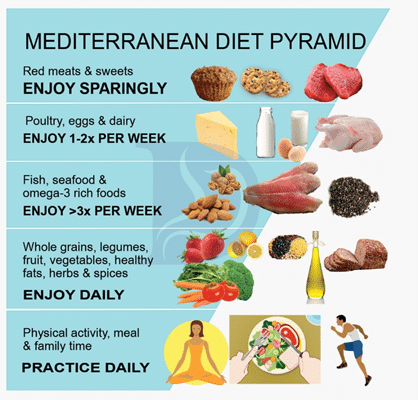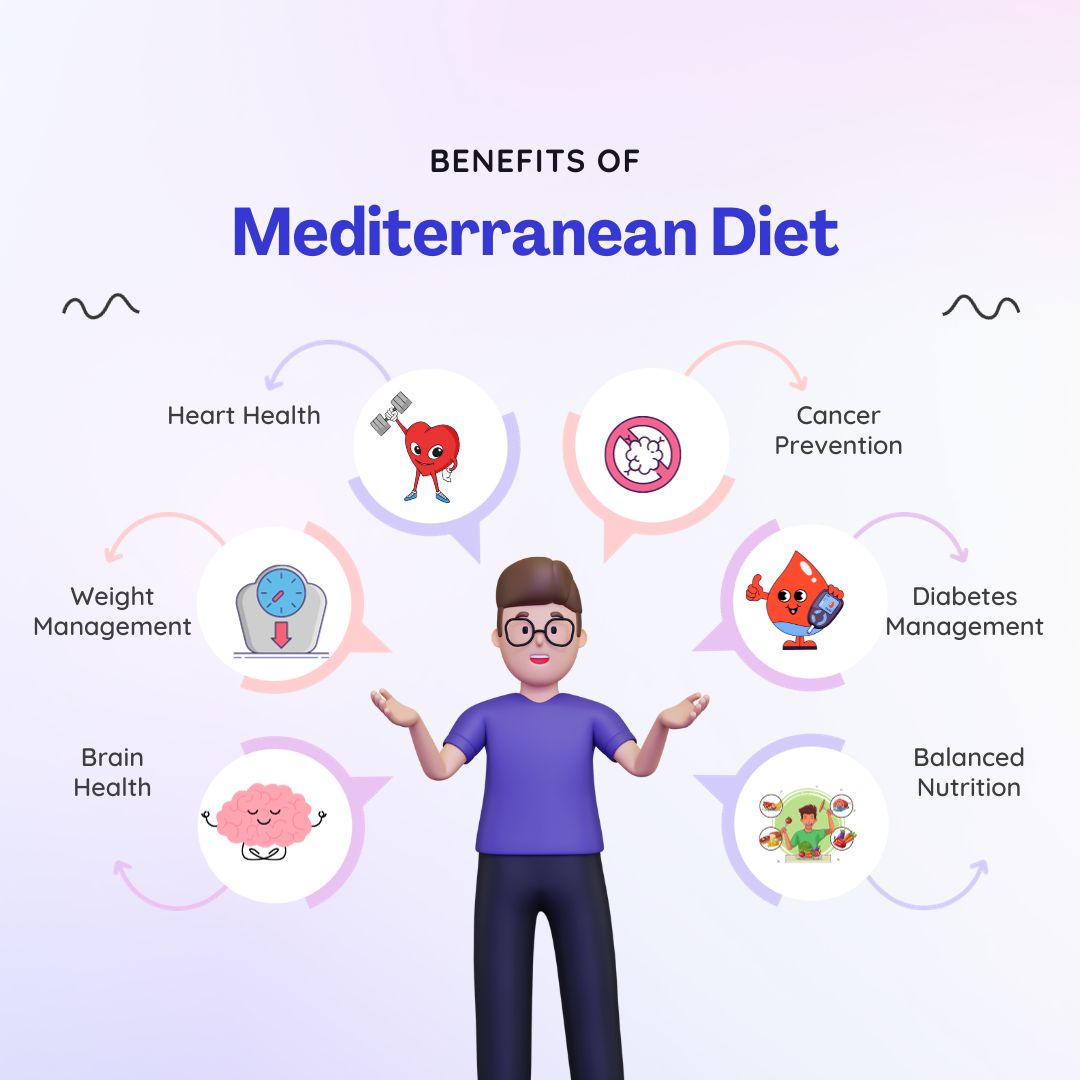Are you in search of a healthy diet to keep yourself healthy and strong?
Then the Mediterranean diet might be the best option for you.
Mediterranean diet?
Yes, a Mediterranean diet can best help you to be healthy and strong.
And did you know? It also plays a key role in preventing most of the diseases.
So, without any further delay let's explore everything regarding the Mediterranean diet. Firstly,
What is the Mediterranean diet?
Mediterranean diet is a type of healthiest eating pattern followed by certain countries(France, Spain, Greece, Italy) bordering the Mediterranean Sea. Ancient eating habits are meant to keep people healthy and a strong Mediterranean diet is preferred by most people for that reason. Now let’s understand,
History of the Mediterranean diet:
In ancient times in the mid-20th century, scientists observed people staying at the borders of the Mediterranean were often healthy and had a lower rate of heart diseases and health problems compared to other parts of the world. Around 1960 Ancel Keys an American scientist came to know that following the Mediterranean diet has a lot of health benefits and lowers heart problems and diseases. For that reason, the Mediterranean diet is followed by most people across the world to reduce the risk of such chronic health problems.
Key principles of Mediterranean diet:
★It includes all healthy foods in your diet such as plant-based foods, fresh fruits, vegetables, whole grains, legumes, nuts and seeds, etc which are highly nutritious and healthy.
★Incorporating good fats like olive oil and fatty fish can be regarded as the key factors in the Mediterranean diet and the essential amount of protein ( meat, fish, etc ) is rich in omega-3 fatty acids. You can also take essential amounts of dairy products such as cheese, and yogurt in moderate amounts.
Foods to include in the Mediterranean diet:
 Whole grains such as whole wheat, barley, oats, brown rice, etc are highly essential in any healthy diet plan. Legumes such as lentils, and chickpeas are good sources of protein and fiber so you can include them. Whole nuts seeds and avocados are sources of healthy fats to be included in the Mediterranean diet.
Whole grains such as whole wheat, barley, oats, brown rice, etc are highly essential in any healthy diet plan. Legumes such as lentils, and chickpeas are good sources of protein and fiber so you can include them. Whole nuts seeds and avocados are sources of healthy fats to be included in the Mediterranean diet.
Foods to avoid in the Mediterranean diet:
Processed foods and red meat which includes pork and beef, lamb, etc should be avoided, and refined grains such as wheat bread, pasta, rice, etc should also be avoided. Also, do not include refined sugars and sugary beverages as they bring out the risk of obesity and diabetes. Avoid saturated fats and fast foods which can be a reason for most chronic health problems.
Benefits of following the Mediterranean diet:
Heart Health:
 You might be thinking about how the Mediterranean diet can keep your heart healthy, but yes as it contains healthy fats from olive oil, almonds, and seafood, that help lower LDL (bad) cholesterol levels while increasing HDL (good) cholesterol thereby promoting a healthy heart. In the Mediterranean as there are potassium-rich foods included in your diet, high blood pressure can also be regulated.
You might be thinking about how the Mediterranean diet can keep your heart healthy, but yes as it contains healthy fats from olive oil, almonds, and seafood, that help lower LDL (bad) cholesterol levels while increasing HDL (good) cholesterol thereby promoting a healthy heart. In the Mediterranean as there are potassium-rich foods included in your diet, high blood pressure can also be regulated.
Weight Management:
Weight management can also be regarded as the added benefit of following a Mediterranean diet by reducing obesity risk., as you are following the healthiest food choices such as fresh vegetables, fruits, and whole grains. You will have a filled appetite due to the nutritious foods and it decreases the risk of overeating.
Diabetes Management:
Along with weight management Mediterranean diet can also help you reduce blood sugar levels if you are including foods low in glycemic index and it also reduces the risk of type 2 diabetes by boosting insulin sensitivity.
Cognitive Health:
The Mediterranean diet includes omega-3 fatty acid foods that promote brain health and are anti-oxidant and anti-inflammatory foods known to reduce the risk of Alzheimer's disease. So overall following a Mediterranean diet can improve your cognitive health.
Cancer Prevention:
As we all have an idea that cancer cases are increasing worldwide regardless the age, the Mediterranean diet is rich in fruits, vegetables, and nuts, as well as antioxidants, which can protect cells from injury and lessen the risk of cancer.
Longevity:
As mentioned above Mediterranean diet is helpful for a healthy heart, preventing cancer, and gives you a healthy weight. It can overall contribute to increased life expectancy in people following the Mediterranean diet.
Improved digestive health:
Yes, along with heart health Mediterranean diet is beneficial for digestive health too, it reduces problems such as constipation due to the incorporation of foods high in fiber, whole grains fruits, and vegetables. Probiotic foods such as yogurt and fermented foods promote a healthy gut microbiota for a healthy gut.
Reduced inflammation:
The incorporation of olive oil, almonds, and fatty fish reduces chronic inflammation, which has been linked to a variety of chronic diseases.
Additional tips :
|
Prefer homemade foods |
You need to select the healthy option for any meal, as homemade foods are made with care; they can be the healthy choice by avoiding outside unhealthy foods. |
|
Stay Active |
While following a Mediterranean diet you need to be physically active. Also, you can include exercises such as walking, swimming, or cycling as the healthiest choice. |
|
Mindful Eating |
Also, you need to be mindful while eating and this can help you to avoid overeating. So, eat slowly chew every bite by enjoying your meals. |
|
Moderation |
As mentioned above do not overeat; eat in moderation as portion control is essential. |
|
Red Wine |
If you are someone who wants to have alcohol in moderation you can include a small amount of red wine in your diet. But you need to be aware that overconsumption is not safe. |
Read more on diet
End note:
We have got a clear idea regarding the Mediterranean diet and it can be most helpful for people who want to keep themselves healthy and strong with the best diet plan. So understand your medical condition, make a healthy diet plan, and enjoy your route to healthy eating!

